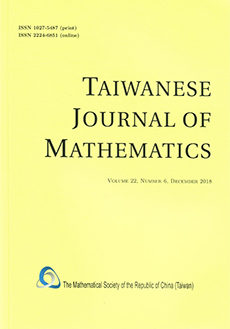Abstract
We consider a two component reaction-diffusion system with a small parameter $\epsilon$ $$ \left \{ \begin{array}{l} u_t = d_u\Delta u + u^{\epsilon_n}(u^mv - au^n),\\ v_t = d_v\Delta v - \displaystyle{\frac{1}{\epsilon}} u^m v, \end{array} \right. $$ where $m$ and $n$ are positive integers, together with zero-flux boundary conditions. It is known that any nonnegative solution becomes spatially homogeneous for large time. In particular, when $n\gt m \geq 1$, $(u^{\epsilon},v^{\epsilon})(t)\to(0,0)$ as $t\to \infty$, while when $m\geq n \geq 1$, there exists some positive constant $v^\epsilon_\infty$ such that $(u^{\epsilon},v^{\epsilon})(t)\to(0,v^\epsilon_\infty)$ as $t\to \infty$. In order to find the value of $v^{\epsilon}_\infty$, we derive a limiting problem when $\epsilon\to 0$ under some conditions on the values of $m$, $n$ and on the initial functions $(u_0,v_0)$, by which an approximate value of $v^\epsilon_\infty$ can be obtained.
Citation
D. Hilhorst. R. Weidenfeld. M. Mimura. "SINGULAR LIMIT OF A CLASS OF NON-COOPERATIVE REACTION-DIFFUSION SYSTEMS." Taiwanese J. Math. 7 (3) 391 - 421, 2003. https://doi.org/10.11650/twjm/1500558394
Information





